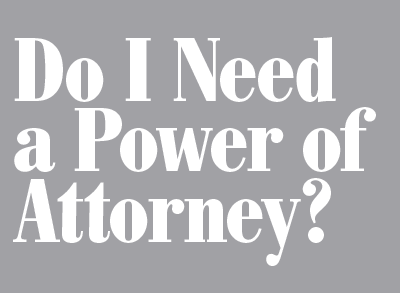Do I Need a Power of Attorney?
 A question CVC is often asked is whether or not patients need a Power of Attorney (POA). But before I can answer that, I’d like you to understand what a POA is and whether one is appropriate for you.
A question CVC is often asked is whether or not patients need a Power of Attorney (POA). But before I can answer that, I’d like you to understand what a POA is and whether one is appropriate for you.
What is a Power of Attorney?
A Power of Attorney is an agreement between two people: a principal and an agent. The principal, or almost always the patient, grants powers to the agent, or the caregiver, to make certain decisions on the patient’s behalf. These decisions can be based upon a range of issues, but they are typically financial or medical decisions. A POA steps in when the patient is no longer able to make decisions on his or her own behalf, and it allows the caregiver to designate who will make those decisions. Without a POA, a court or state may be able to designate someone to make decisions on the patient’s behalf. The person appointed might not be the person the patient would choose to make his decisions.
As an example, married couple John and Peggy choose to draft durable Powers of Attorney granting one another the authority to make financial and health care decisions on one another’s behalf. John discovers that he is diagnosed with Huntington’s Disease and eventually loses capacity to make decisions on his own. Because of the POA, Peggy can make decisions for John. Without that POA, their home state of Idaho could determine that Peggy is not the best person to make those decisions and instead designate John’s cousin, Nell, to make those decisions.
Do I need a Power of Attorney?
Probably. Most people who own property or have any money will need to make financial decisions, or difficult health care decisions later in life. If this is the case for you, you may want to consider having a POA in place.
The Specifics
When you draft a Power of Attorney, you must have the capacity to do so. Capacity is essentially the ability to make or enter into a legal relationship the same way someone with a sound mind would. Everyone is assumed to have a sound mind and be of normal intelligence. Someone can try to prove that you no longer have capacity. However, to do that, they must have specific and realistic proof.
So, if your illness is expected to progress in a way that may cause you to lose capacity, it is better to draft a POA sooner rather than later. You can speak to an attorney about tactics like videotaping the signing, getting one or many doctors’ statements of your competence, and/or having multiple witnesses at the signing of your POA to further support your capacity.
A POA must be durable to last after a patient loses his capacity. A durable POA will remain intact after the patient is no longer able to enter into legal relationships. A POA will terminate at death, even if it is durable.
The laws that govern Powers of Attorney vary state by state. Many people will need separate POAs for health and financial issues. Consult an attorney in your state to answer any specific questions you have and to draft a POA for you. If this is not financially possible for you, many state Departments of Health have free Medical Powers of Attorney or Health Care Proxies available through their offices. Contact your local Department of Health to request a copy of their form and for any specific instructions to complete.
If your family does draft a Power of Attorney, please send a copy to CVC. We can keep it on file in case the caregiver must sign on behalf of the patient when completing a new Terms and Conditions form or the incredibly important Renewal to receive a grant in
the new year.
The information presented in our website’s “Legal Corner” section is intended to provide information of general interest to the public and should not be relied upon as legal advice or counsel. This information should not serve as the basis for any legal decision by you. The information offered is not intended to create an attorney-client relationship, and your visit to our “Legal Corner” shall not be deemed to create such a relationship. Information posted in our “Legal Corner” may not reflect recent legal developments or decisions and therefore website visitors should consult an attorney if you have legal issues requiring attention.
Contact us
Did you enjoy this story? Email us your comments and questions and let's keep the conversation going. We encourage you to engage with us and other readers by following us on Facebook, Twitter, and Pinterest. Every person's journey is unique, and every perspective is valuable to us.











